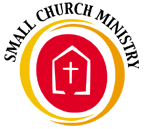 bits from bob....
bits from bob....
 bits from bob....
bits from bob....

Introduction
Today in kickoff for "Small Church Growth Workshop," I want to introduce an idea which will help us conceptualize the small church. The small church: we want to see it, feel it, turn it over in hands, examine it--like the fine diamond it is. I want to say something of the nature of ministry in the small church, ministry which understands and respects God's unique role for the small church.
I begin in 1 Cor. 1:18ff. God has in history used the foolishness of world in powerful ways. Paul sets forth the "foolish message" (1:18-25), accepted by "foolish believers" (1:26-31), proclaimed by "foolish preachers" (2:1-5). But it is in reality a "wise message" (2:6-7), accepted by "wise believers" (2:8-12) proclaimed by "wise preachers" (2:13-16). This is our beginning point today.
Frankly, small church does not usually appear to be a part of wisdom from the human persepctive. In our day of church mergers, churches combining, and an emphasis on size, the small church seems insignificant, a problem to be solved. Yet a few years ago our Southern Baptist neighbors announced a goal of planting 1000 churches in Texas. The question is not man's wisdom, but God's wisdom. The focus must be on God's unique role, God's place for the small church.
I. WELCOME TO THE WORLD OF THE SMALL CHURCH
You may not even know there is a small church world, although I suspect you know it all too well. That's why you're here. I grew up in small church, but it didn't seem small, it was same size as everything else in my world. Only later I learned that it was a small church. The town was small, outlook was small, church didn't seem any smaller than anything else in my world. It was just church! Beginning of healthy understanding of truth is that God has a place for small church.
What is a small church? The definitions vary from 35 to 200. Consider churches with less than 35 members. In Oklahoma, about 1/4 of the churches of Christ are in this category. In Kansas, the number is 42%, and the percentage is even higher in missions states. Consider churches with less than 75 members. In Oklahoma, over 1/2 of our congregations have less than 75, in Arkansas, the number is 64%, and the numbers range even higher in rural and missions areas. Some think the magic number for determining that a church is small is about 100. Others have suggested numbers as high as 200. I have not heard anyone suggest a number higher than 200. Working with this number, 80% of the churches in Oklahoma have less than 200, nationwide the number is 85%. The Presbyterians claim that 95% of their congregations have less than 250. In the 1980 census work by Mac Lynn, 636 churches of Christ were larger than 300, approx 5-6%. We're not really much different than religious world about us when it comes to small churches, with regard to the percentage of small churches, or in the size of our churches.
The Challenge of the Small Church
McKenna (Renewing Our Ministry, 45-46) cites an unpublished survey of Leadership magazine readers in which they report frustration at coming home from conferences, seminars, workshops with surefire ideas for renewal and even revolutionizing their churches, yet when present those dreams, neither the fire of enthusiasm nor the drama of the dreams could be transferred.
Ministry in the small church can be extremely frustrating if one does not understand the nature of small church. I hope to help with these ideas, to ease confusion, to eliminate some of the frustrations. It is easy to attribute problems in small church ministry to either madness or badness. People oppose you, oppose your positions, you tend to think they're lousy Christians, nuts, or both. But there is a third alternative: people in small churches operate out of a different system than in average church--a system with different values, perceptions, understandings. They have a different view of the world. It is neither right nor wrong, but if we are to minister effectively in small churches, we must first step into that world in the same way that Jesus Christ stepped into our world to minister to us.
My goal is to provide a roadmap to get us into the world of the small church. We must eat, sleep, breathe, study, understand the small church. If you've not been there, or if you've gotten sidetracked along the way or taken some detours that were less than helpful, welcome to the journey to another world.
The Nature of the Small Church
Willimon and Wilson (Preaching and Worship in Small Church, 14) suggest a focus on what a small membership church does best--provide a Christian community where people participate in worship, hear the Word, and carry on ministry to one another and to the larger community.
To carry further some studies of church models, the small church is like a family. Delores Curran's book, Traits of a Healthy Family, may be helpful when she reminds that the family:
There is such an animal as the small church! What shall we do?
What is God's place, unique role, working in the small church, working for the small church, working with the small church? To address that topic, explore two questions: "What Makes a Small Church different?" and "What are the dynamics of the Small Church?"
II. WORKING IN THE SMALL CHURCH--IDENTIFYING THE SMALL CHURCH--THE NATURE AND DYNAMICS OF SMALL CHURCHES
What is a Small Church like? Some of its characteristics include the following:
While we must look at more than numbers, David Ray (Small Churches are the Right Size, p. 34ff) adds two factors that are basically numerical. (1) What are the numbers in worship and membership, and were these numbers previously larger? (2) What are the other numbers, e.g. auditorium size (is it too large?), comparison to other churches, size of building, size of budget (survival mode?), size of staff, size of programs.
Walrath ("Types of Small Congregations and the Implications for Planning," in Small Churches Are Beautiful, Jackson Carroll, ed.) says we can only understand the small church through social context, social position, amd type (referring to the three types mentioned above).
How are small churches different? At least in the following areas: relationships; identification through shared experiences, often past rather than present; members who know each other--single cell; relational (lots of large churches are trying to become more like small churches); turf identification issues are often paramount; education (Sunday School) is often central; fundamental goals, values, dreams; limited resources; unique interpretation of reality; have own perspective.
III. WORKING FOR THE SMALL CHURCH--UNDERSTANDING THE SMALL CHURCH; GOD'S UNIQUE ROLE--SPECIAL PLACE--FOR THE SMALL CHURCH
David Ray shares this illustration. Duck hunter, mail-ordered full trained retriever pup. Picked up at airport, stopped at roadside pond to test the dog. Threw stick across pond, gave command to fetch. Pup leaped for water, ran across top of water to stick, picked it up, ran back across the water. The hunter was astounded. Repeatedly threw stick, dog repeatedly retrieved it, walked across top of water, in same unorthodox way. Wanting to show off remarkable dog, hunter picked up George for a demonstration. With knowing smile, hunter threw stick, gave command, dog ran across the water to retrieve the stick. After repeated demonstrations, no response from George. Finally hunter was exasperated, "What do you think of my new dog?" Can't swim, can he?
There is a strong resemblance between that unorthodox, gifted retriever and a lot of small churches. Lots of small churches don't swim very well, or evangelize, or _______________ (you can fill in the blank). Small churches generally do things in unorthodox ways. (Cf. Schaller, The Small Church is Different!)
If one measures the small church by a large church, one is going to be disappointed, and likely conclude the small church is not very effective. But God has a unique role for the small church.
THE UNIQUE ROLE OF THE SMALL CHURCH
